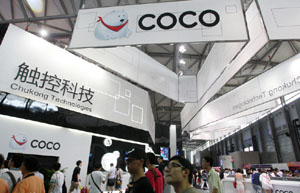The sky is the limit, but only for so long
By Neil Flynn (China Daily) Updated: 2014-07-21 07:15But given that in the first quarter of this year there were more IPOs than in any first quarter since 2000, it would be logical for investors to have an air of trepidation about such high valuations. Should the market lose its seemingly insatiable appetite for IPOs, high-tech firms will be among the first to be sold. This is because their valuations, more than most, are based on hype and expectation rather than on fundamental growth and earnings.
Chinese firms would also be sold because they tend to be domestically focused. If investors want to reduce risk from their portfolio, it is natural to keep hold of the companies they understand best. Given that it can be difficult to understand domestic trends if you are not based in China, foreign investors are likely to sell.
Should appetite wane, Chinese tech firms would lose an important source of funding for their development and expansion. The venture capital industry in China is not well developed, and such investors tend to have a short time-frame before they want a return on their capital. Likewise, it is becoming more and more difficult for Chinese firms to list on domestic stock markets. While a year-long freeze on IPOs that stretched from 2012 to 2013 has been lifted, stringent regulations are still in place. In January, an anti-cancer pharmaceutical firm had to shelve its proposed 790 million yuan ($127 million) IPO on the ChiNext board because the proposed issuance was too big.
In the long run, the ability to list in the US will be a strong driving force for Chinese firms to continue their growth and development. Not only do US equity markets offer a much larger investor base for Chinese firms, but it also publicizes the strength of the Chinese economy to the rest of the world.
Recently, mergers and acquisitions activity in China has been at a high, led by Alibaba and two other tech companies, Baidu and Tencent. Baidu recently sold $1 billion of notes so it can buy mobile technology firms, as a response to the success of Tencent's WeChat platform. Yet we are seeing more and more acquisitions from smaller companies, such as VIPShop, which recently bought the cosmetics retailer LeFeng. Acquisitions are now the best way for Chinese firms to develop their market share in online shopping, and the funding from US investors is integral to this strategy.
I think that by next year, the IPO market will have begun to stutter, as investors realize that the sky-high valuations are not sustainable. In the meantime, if Chinese firms can continue to monetize more aspects of their operations and continue to grow earnings, investor confidence will remain high.
The author is head equity analyst at Chinese Investors.com, a Shanghai-based financial analysis firm. The views do not necessarily reflect those of China Daily.
 |
 |
| Top 10 biggest IPOs by game manufacturers | Top 10 Chinese Internet firms eyeing IPOs in US |
- Second batch of IPO applications waiting approvals, CSRC says
- IPO guidance spurs stock speculation
- China expects around 100 IPOs from June to Dec
- 9 IPOs launched by Chinese companies in US this year
- Top 10 biggest IPOs by game manufacturers
- More Chinese companies choose US as destination to go public
- China Unicom's mobile subscribers grow 0.6% in June
- China's June forex purchase likely to rebound
- Waning lock-up shares eligible for trade
- Meat supplier of McDonald's, KFC suspended
- A land of rich pickings
- China Development Bank opens office in Venezuela
- Urumqi boasts first marsh gas power plant
- Villagers turn to smartphones, blogs to promote harvest















